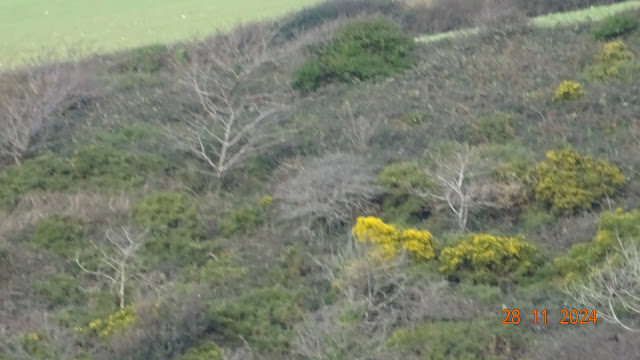2024 Day 334
2024 Dedh Trei Hans Peswardhek warn Ügens
De Gwener, nawes warn ügens mis Dû
Friday, 29th November
Perhen an mena ma ew Arlòdh Falmeth. Nag era balweyth òbma e'n etegves cansbledhen. Derevys ew an jynn-jy a ven a'n costys. Ma nebes mòngleudh coth en ogas. Na ello whei gweles an meyn lebmyn, drefen bos overdevys gen idhyow. Kidnyadh ew termyn da rag y weles - glas ew an idhyow bes loos ew an gwedh. (Na ellen nei ûsya an ger "glas" òbma en le "loos".) Balweyth a dhallathas en etek cans trei ügens ha pajar ha diwedhes en etek cans trei ügens hag etek. An mena ena o lobm ha segh. Plobm, arhans, zynk, arsenik ha mundyk o tednys mes an mena. Dew dhen a verwas: Wella Jewell (carpenter) ha Wella Tamblyn (den an plomp). Diantel o an whel. Ownys ew an dor ha lebmyn nei ell gweles bagasow owryek a eythin.
The owner of this hillside is Lord Falmouth. There wasn't any mining here in the eighteenth century. The engine house is built from local stone. There are several old quarries nearby. You can't see the stones now, because it's overgrown with ivy. Autumn is a good time to see it - the ivy is green but the trees are grey. (We can't use the word "glas" here instead of "grey".) Mining started in 1864 and ended in 1878. The hillside then was bare and barren. Lead, silver, zinc, pyrite and arsenic were extracted from the hill. Two men died: William Jewell (mine carpenter) and William Tamblyn (pump man). The work was dangerous. The ground has recovered and now we can see golden bushes of gorse.
Geryow rag hedhyw Words for today
a'n costys local, of the area
derevys built
diantel dangerous, risky
en le instead (of)
eythin (coll.) gorse
idhyow (coll.) ivy
lobm bare (of hill)
mena (m) hillside
mòngleudh ~ mòngla (m) stone quarry
mundyk pyrites, fools' gold
overdevys overgrown
ownys recovered, mended
perhen (m) owner
tedna mes to extract, pull out




Comments
Post a Comment